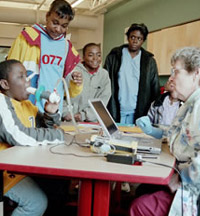|
|
The King County Asthma Forum (KCAF) |
Coalition Overview
The King County Asthma Forum (KCAF) Allies Against Asthma program in King County, Washington focused on improving and supporting asthma prevention, diagnosis, and management in King County. KCAF targeted the health of low income children in Central and South Seattle and Southwest King County.  The hospitalization rate among children with asthma in this area was almost double that of King County and increased 62% from 1988 to 1995. The majority (53.3%) of target area residents are racial minorities and represent more than 25 distinct ethnic groups. The target population receives medical care in a variety of settings, and there existed challenges in providing the population with optimal care. The hospitalization rate among children with asthma in this area was almost double that of King County and increased 62% from 1988 to 1995. The majority (53.3%) of target area residents are racial minorities and represent more than 25 distinct ethnic groups. The target population receives medical care in a variety of settings, and there existed challenges in providing the population with optimal care.
KCAF was convened in 1998 by the American Lung Association of Washington and the local public health department as a forum for sharing information about the sizeable asthma work taking place in the community. At its inception, KCAF was strictly a voluntary organization with no funding and no direct programs. Allies Against Asthma funding allowed KCAF to move beyond information exchange to active involvement in asthma interventions.
KCAF's vision for integration was one built on strong linkages across all sectors in the community. Those linkages at the systems, programmatic and client levels created a seamless system of care for individuals with asthma. Three components made up KCAF's integration efforts:
- multi-disciplinary collaboration across institutions and sectors
- service coordination
- cross-condition integration. The coalition provided a forum and framework for integration; the Allies Against Asthma program provided an opportunity to test integration on a programmatic level.
KCAF continues much of its work with funding from the Steps to a Healthy US program.
return to top
Key KCAF Activities and Downloadable Products
 Materials about KCAF: Materials about KCAF:
 Presentation about KCAF (.ppt) Presentation about KCAF (.ppt)
 Strategic priorities, 2005-2008 (.doc) Strategic priorities, 2005-2008 (.doc)
 Authorship criteria for peer-reviewed publications (.doc) Authorship criteria for peer-reviewed publications (.doc)
return to top
 With health care providers: With health care providers:
Asthma Care Training (ACT): utilized clinicians to teach children with asthma and their families about asthma symptoms, medications, triggers and self-management skills
Learning Collaborative: an intensive clinical quality improvement intervention led by a physician asthma champion and a quality improvement team; included the use of an asthma registry, a tool for clinics that improved asthma care by helping identify the asthma patient population, monitor patient care, and evaluate quality improvement activities
 Compilation of select Learning Collaborative materials (e.g., agendas, Asthma registry user guide, group discussion) (.doc) Compilation of select Learning Collaborative materials (e.g., agendas, Asthma registry user guide, group discussion) (.doc)
 Presentation: chronic care model (.ppt) Presentation: chronic care model (.ppt)
 Presentation: asthma registry introduction (.ppt) Presentation: asthma registry introduction (.ppt)
 Registry data collection form (.pdf) Registry data collection form (.pdf)
 Presentation: action period 1 (.ppt) Presentation: action period 1 (.ppt)
Other provider education: provider education workshops and educational sessions that covered asthma basics, offered updates on asthma management and introduced providers to community asthma resources
return to top
 In the home & about housing: In the home & about housing:
Community Health Worker Program: multilingual, trained CHWs visited families in their homes to provide education, resources and case coordination to better manage children's asthma. Protocols were developed in conjuntion with the Healthy Homes II project, which employed Community Asthma Specialists
 Recruitment flier (.doc) Recruitment flier (.doc)
 Telephone screen script (.doc) Telephone screen script (.doc)
Baseline Interview:
 English (.doc) English (.doc)
 Spanish (.doc) Spanish (.doc)
 Vietnamese (.doc) Vietnamese (.doc)
Exit Interview:
 English (.doc) English (.doc)
 Spanish (.doc) Spanish (.doc)
 Vietnamese (.doc) Vietnamese (.doc)
 Home environment protocols (.doc) Home environment protocols (.doc)
 Self management protocols (.doc) Self management protocols (.doc)
 Flashcards for identifying medicines (.ppt, 3.3 MB) Flashcards for identifying medicines (.ppt, 3.3 MB)
 Zipped folder of operations manual (.zip, 4 MB) (manual was developed for the Allies Community Health Worker program and was later adapted to be used in the Steps to a Healthier US program) Zipped folder of operations manual (.zip, 4 MB) (manual was developed for the Allies Community Health Worker program and was later adapted to be used in the Steps to a Healthier US program)
Master Home Environmentalist Program: extensively trained volunteers reduced household exposure to lead, allergens, pesticides and carcinogens in the home through assessment and a Home Action Plan that offered low or no-cost solutions for reducing exposure
Healthy Homes II: offered patient education, training in self-management, creation of an asthma action plan, and in some cases, in-home outreach, education and resources to address environmental triggers
Better Homes for Asthma: provided structural housing remediation for reducing exposure to asthma triggers for families who have children with asthma
return to top
 In schools & childcare centers: In schools & childcare centers:
Tools for Schools: an environmental management program for schools that provided prevention and remediation of indoor air quality problems
Open Airways for Schools: asthma management program for schools that educated students with asthma, parents and school staff
Team Asthma Goes to School (TAGS): made available a group of experts on asthma school-related issues to parents, school personnel and students
Training Childcare Providers: taught asthma and allergy basics to childcare providers in conjunction with the Washington Chapter of the Asthma and Allergy Foundation
return to top
 In the community and clinic: In the community and clinic:
Neighborhood Asthma Committees: individuals with asthma, their families and others with an interest in asthma identified and implemented an annual educational and awareness-raising project for their community
Public Relations, Community Outreach and Education: raised awareness and increases knowledge within the general public
return to top
 Other KCAF Allies activities and products: Other KCAF Allies activities and products:
Asthma support triage line: a toll-free line staffed by bilingual community health workers that connected people with asthma to community and medical resources
Attack Asthma Bill: KCAF partnered with American Lung Association of Washington and the Washington Asthma Initiative state asthma coalition to gain passage of bill allowing students to self-carry medications while at school
Additional Educational Materials: can be found on the KCAF Allies website.
return to top
|


